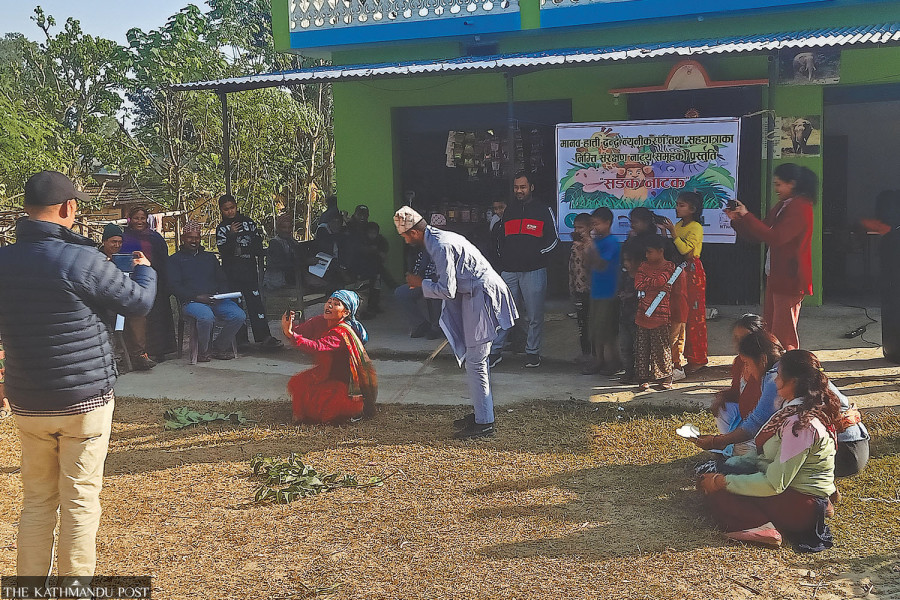National
Shuklaphanta buffer zone community unites to promote human-wildlife coexistence
Like-minded people stage street dramas to raise awareness among the locals about the importance of wildlife conservation and ways to minimise human-animal conflicts.
Bhawani Bhatta
Every night for the past week, Ganita Negi of Gobariya in ward 15 of Bhimdutta Municipality has been keeping vigil on her farmland to protect crops from wild animals. The reason is that a herd of wild elephants has been visiting her paddy field near Shuklaphanta National Park for the past week.
Negi has also been helping her neighbours chase away animals in a safe manner. She informs the locals immediately after the wild animals enter the farmlands.
Although she has not been getting a full night’s rest lately, Negi harbours no grudge against the elephants. It is quite a risky job she has undertaken, chasing wild elephants from her farmlands at night. But despite it all, she has been actively raising awareness about wildlife conservation in the area.
Negi and other like-minded people from her neighbourhood stage street dramas to sensitise the locals about the importance of wildlife conservation and why it is necessary to focus on minimising human-animal conflicts.
Negi and her team have been visiting various settlements in the buffer zone areas as part of an awareness programme for wildlife conservation. “It is obvious that the wild animals show up in the settlements near the national park. But we have to know how both humans and animals can stay safe,” said Negi, while staging an awareness drama at Hattithala in ward 1 of Bedkot Municipality last week. “One should not react aggressively when wild animals enter the settlement. It can be dangerous for both the animals and humans.”
Negi and her team members teach people about the wild animals’ behaviours, and how to safely chase them away in case they enter the settlements. They give tips to the locals on how to drive away the animals without harming them.
“The first thing to do is to inform the national park employees. Trying to chase wild animals on your own can be quite dangerous,” said Ganesh Karki, an artist in the team.
“Beating drums loudly and making bonfires at a distance can help in driving them away. Farmers should plant crops that wild animals generally don’t like. Consider planting lemon, ginger, and turmeric instead of sugarcane, banana, paddy, and wheat,” he said.
Karki’s father Dansingh had fractured his leg while chasing wild elephants a year ago. He attempted to chase away the tuskers that entered his paddy field. But the elephants scared him away instead. “I had a narrow escape. My leg hurts to this day,” said Dansingh. Wild animals, mainly elephants, damage crops planted in Karki’s field almost every year.
Forgetting all the damage and hardships incurred by animals, Karki too is now active in wildlife conservation. He has clearly understood that humans are safe only with the conservation of forests and wildlife. He advocates for the co-existence to minimise human-animal conflicts.
“I am now educating the locals about wildlife conservation. Animals frequently come to the settlements near the national park. We are giving a message to the local people that we should not kill the animals but chase them away to the forests safely,” said Karki.
The team named Shuklaphanta Play Group has been staging street dramas at Dodhara Chandani, Bhimdutta, Bedkot, Shuklaphanta municipalities and Beldandi Rural Municipality for the past five years.
Shuklaphanta is the country’s second youngest national park, after Parsa National Park, and is the main habitat of swamp deer. The largest herd of swamp deer in Asia can be seen in the grasslands of Shuklaphanta, according to conservationists. It is also the home of various species of animals like tigers, rhinos and 461 bird species.
The human-animal conflict is unchecked in the area. Elephants, tigers, leopards, wild boar, and nilgai among other animals enter the settlements quite frequently. As per the data available at the national park, a total of five people were killed by wild elephants over the past five years.
Currently, a herd of about 15 wild elephants have been frequenting the settlements almost daily and wreaking havoc. According to the conservationists, the tuskers entered Shuklaphanta from Dudhwa National Park of India around one and half months ago.




 9.83°C Kathmandu
9.83°C Kathmandu














